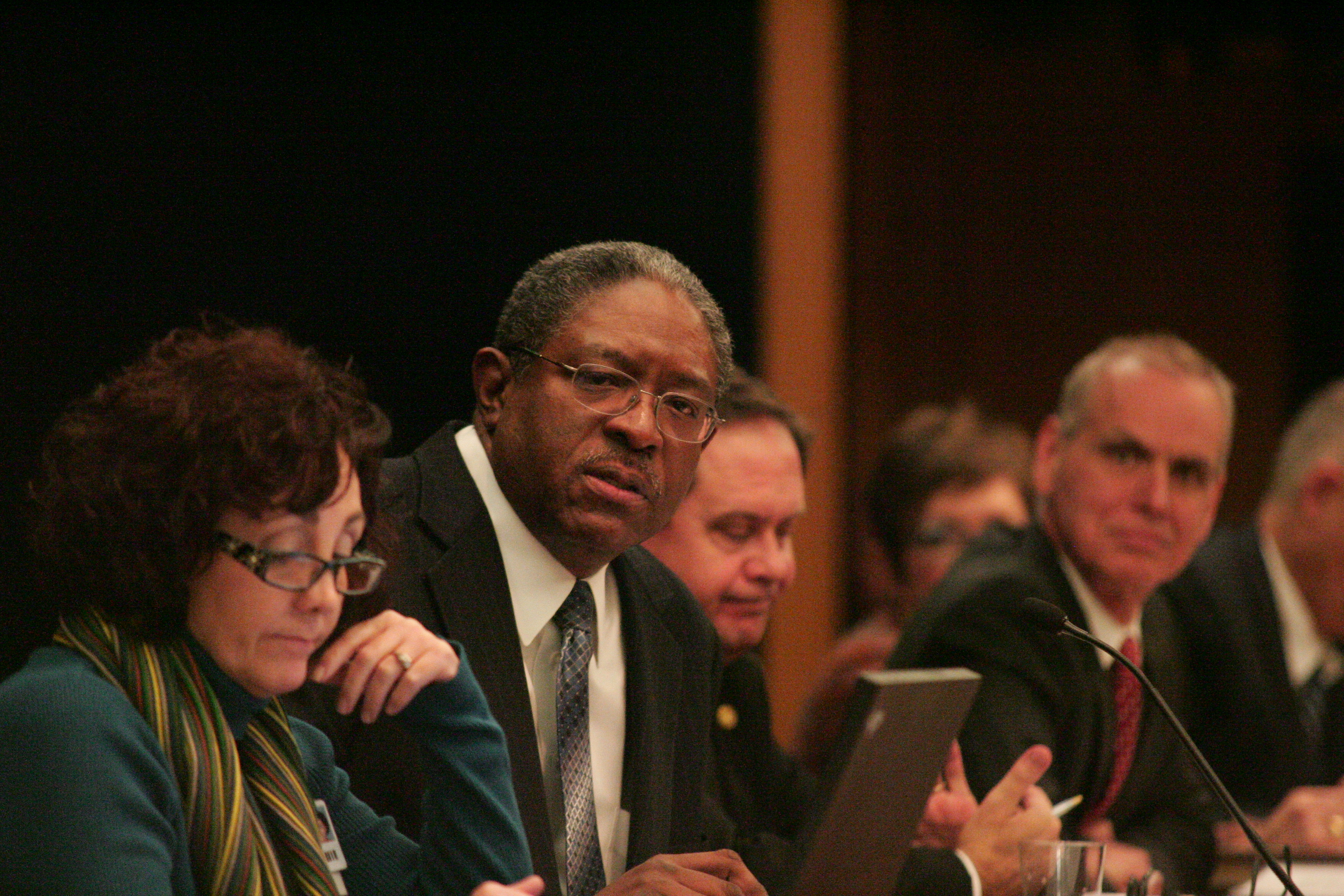BY THE BOARDCurrent board appointments• Twelve voting members• Terms: Four years• Replacement: Chosen by appointing body (city/county*, 4 members each; chancellors, 1; legislative delegation, 1; medical society, 1; medical chief of staff, 1)• There are two vacancies on the board; both are county mayor appointeesProposed board appointments• Seven voting members; two nonvoting members, an educator and a physician, chosen by voting members• Term: Three years, with a three-term maximum• Replacement: Chosen by boardSource: Erlanger, General Assembly
If state lawmakers have their way, Thursday's meeting of the Erlanger Health System board of trustees might be one of the last, at least in its current configuration.
A bill restructuring the board, to be introduced Monday, could pass the General Assembly by Feb. 11 and a new board could be in place by mid-March, House Majority Leader Gerald McCormick said Thursday.
"We are still putting the final touches on the legislation with our legislative legal staff" and expect to have the bill finished by the end of next week, McCormick said.
"By the middle of March, we could have a completely changed situation."
Trustees held a 15-minute meeting Thursday and did not mention the lawmakers' move. Dr. Phyllis Miller, head of a search committee looking for a new hospital CEO, said it is too early to tell how the proposed legislation might affect the process.
McCormick and state Sen. Todd Gardenhire, both Chattanooga Republicans, announced the changes in a joint news release Thursday afternoon.
"Erlanger is one of our region's most valuable and critical assets. The size, scope, and mission of Erlanger and T.C. Thompson Children's Hospital have grown in the last 37 years, and how the Authority is governed at the board level must also evolve," McCormick said in the release.
Gardenhire noted that Erlanger now has more than $500 million in assets and $500 million in revenues, and called the revamp an "ongoing process towards providing corporate oversight consistent with similar enterprises."
The changes, he said, "are necessary to equip Erlanger to more effectively compete in an intense and ever changing industry," he said. "This is certainly no reflection on the existing board, but recognition of marketplace realities given the corporate environment in which this public entity must operate."
Ronald Loving, chairman of the board of trustees, said he got a phone call and email from McCormick notifying him of the proposed change, and he told the board members Thursday.
"There have been no decisions made -- we got it, we're disseminating and sort of digesting it," Loving said. "We're just thankful and appreciate getting the copy, and we look forward to working with the delegation for betterment of patients and community that we all serve."
•••
The lawmakers said the new board will shrink from 12 to nine members. There will be seven voting members plus two nonvoting representatives: one from education and a physician with current or past staff privileges at Erlanger. Members will serve three-year terms and no member may serve more than three terms.
McCormick said the delegation will work with County Mayor Jim Coppinger to choose the initial board members. Thereafter, the other board members will fill vacancies by majority vote.
Coppinger said Thursday he had been talking with the delegation about expected changes -- in fact, he had left two of the county's four board seats vacant for that reason.
Coppinger didn't want to speculate Thursday about possible names for the new board.
"At this point, to mention people's names we're considering putting on the board or anything wouldn't be helpful to anyone," he said.
There'll be time enough once the legislation reaches its final form, he said.
"We're open-minded. ... After we look at this draft proposal we're going to be afforded an opportunity to weigh in and we'll have some type of dialog [with lawmakers]."
•••
The county's state lawmakers first talked about reforming Erlanger's governance structure during last year's session.
The hospital's board of trustees had just forced out the third consecutive CEO, Jim Brexler, after the hospital drove away doctors and lost more than $6 million in five months. Before Brexler, CEO Dennis Pettigrew presided as state and federal agencies investigated allegations of improper payments to physician groups put in place by then-CEO Sylvester "Skip" Reeder. In October 2005, hospital trustees agreed to pay $40 million to settle that investigation.
As the search began looking for Brexler's replacement, some hospital partisans worried that the University of Tennessee College of Medicine, which runs medical training programs through Erlanger, was seeking to expand its influence over the hospital.
UTCOM officials lobbied state lawmakers last year for seats on the Erlanger board, and a UTCOM associate professor is one of the three finalists for the CEO post.
McCormick wrote trustees Dec. 19, after they had begun interviewing the finalists, asking them to slow-walk the decision in anticipation of legislation amending the health system's governance.
Trustees held a closed meeting on Dec. 27 and said they would stick to their original timetable, but Miller said last week she had told McCormick the vote might be pushed up.
Hearing from some trustees that the CEO vote could come as soon as Thursday, McCormick sent another letter, signed by all seven delegation members, warning trustees again not to make a hire that could end with a costly contract buyout if the hospital's governance changed.
Meanwhile, under interim CEO Charlesetta Woodard-Thompson has been working to bring back doctors and their business.
This week, hospital officials said Erlanger had lost $2.5 million halfway through the fiscal year. That's compared with a $10.5 million loss for the same period last year.

